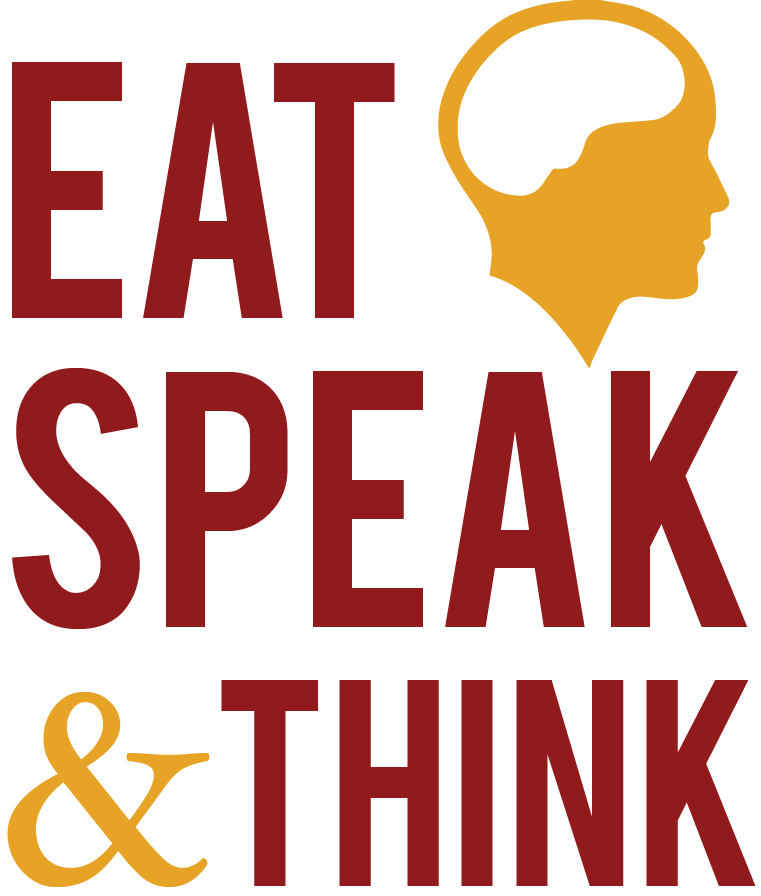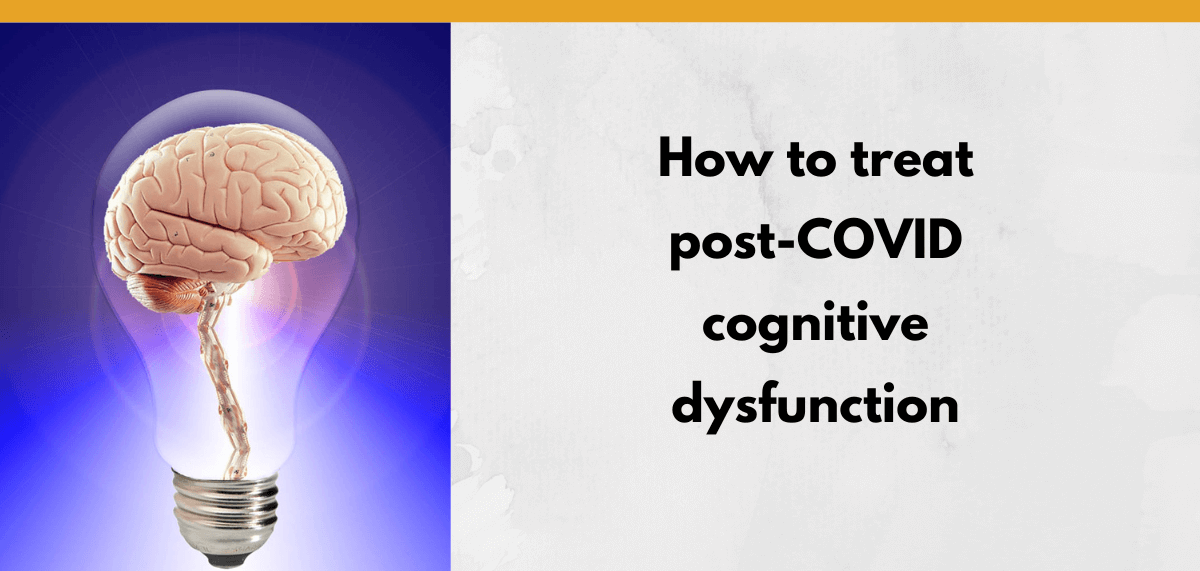Post-COVID cognitive dysfunction can be debilitating. While we’re still in the early years of treating long COVID, we do have guidance for best practice. For the most part, this information is drawn from a very practical and informative seminar I took from Rebecca Boersma, a speech-language pathologist who works in a post-COVID clinic at the George Washington University Hospital.
Free DIRECT download: Treating post-COVID cognitive dysfunction (cheat sheet). (Email subscribers get free access to all the resources in the Free Subscription Library.)
Outline:
- Cognitive symptoms post-COVID.
- Set expectations for cognitive rehab.
- Use a dynamic coaching model.
- Teach cognitive pacing and task monitoring.
- Train compensatory strategies.
- Promote self-efficacy and resilience.
- Learn more.
- Related Eat, Speak, & Think posts.
- References.
Cognitive symptoms in long COVID
Davis et al. (2023) share the results of a meta-analysis, which found fatigue in 32% and cognitive impairment in 22% of people after recovering from the initial COVID infection. They report that, at 12 weeks post-COVID, the level of cognitive impairment is similar in magnitude to “10 years of cognitive aging.”
They also reported a study of more than 1.3 million people who had increased risk of cognitive impairment and other neuro-cognitive conditions that persisted for at least 2 years post-COVID.
Strikingly, cognitive impairment was found among people recovered from initial infection in higher rates using objective testing versus subjective report. This suggests that some people are not aware of (or did not report) cognitive changes post-COVID. (Davis et al, 2023)
The CDC provides a list of common symptoms in long COVID, including brain fog. Rebecca Boersma (2022) reports that brain fog can lead to difficulty with:
- Concentration.
- Processing.
- Working memory.
- Completing simple mental tasks.
- Creativity.
- Making decisions.
- Initiation.
- Word-finding.
Set expectations for cognitive rehab
It’s important to establish realistic expectations from the first session with our clients. Speech-language pathologists treat the cognitive-communication symptoms of long COVID, not the underlying mechanisms of the impairment.
This means that we shouldn’t allow our patients to expect that we will help them regain their normal cognitive functioning. While we can teach patients to manage their individual cognitive-communication symptoms, unfortunately, we cannot cure the underlying problem.
Therapy for cognitive-communication impairment post-COVID includes:
- Teaching cognitive pacing and task monitoring.
- Training personalized compensatory strategies.
- Educating patients in order to promote self-efficacy and resilience.
Given that brain-training games haven’t been shown to improve cognitive skill for daily activities, they aren’t recommended in general. However, if you have a specific computer-based exercise that specifically targets a real-life skill, you may choose to recommend it. For instance, I often recommend Tactus Therapy apps for word-finding impairments.
Use dynamic coaching
Hoepner et al. (2019) provides a good description of how to use a dynamic coaching model for cognitive rehab in their case study with two college students with acquired brain injury. I recommend reading the paragraph under “Coaching Intervention” for more details, but here is the approach in a nutshell.
We can use dynamic coaching to help our patients develop their ability to problem-solve the cognitive challenges they face in their daily life. We assist our patients in learning how to generate potential solutions, independently try them out, and assess what worked and didn’t work.
The therapist uses the OARS technique:
- Open-ended questions.
- Affirming.
- Reflecting.
- Summarizing.
Boersma (2022) provides extensive discussion on using dynamic coaching with our long COVID patients.
Teach cognitive pacing and task monitoring
Boersma (2022) had a fascinating discussion on cognitive pacing and task monitoring. She provides two slides that will be helpful to use with patients, and patients can then use them with family or others to advocate for the support they need.
One slide is the “Energy Pie” from Somers (2018). This shows the concept of the healthy brain having a certain amount mental energy per day, with a certain amount used for mental, physical, and emotional activities plus a solid cognitive reserve. The energy available to a brain after an acquired brain injury is substantially less, with far less cognitive reserve.
Another is the Spoon Theory of mental energy from Miserendino (2003). We can ask our patients to visualize having so many spoonfuls of energy per day. Every day could be different. Our patients can estimate how many spoonfuls of energy their daily tasks require: showering, dressing, eating, having a challenging conversation, paying the bills, etc. Then they can estimate how much they can do in a given day, based on how they feel.
We can also ask our patients to engage in restorative activities that could provide a boost in mental energy, such as:
- Putting their feet up.
- Napping.
- Praying or meditating.
- Listening to music
- Whatever they think would work for them.
Train compensatory strategies
In addition to assisting our patients to devise their own possible solutions, we can also teach specific strategies that they may find helpful.
For example, we can teach Goal-Plan-Do-Review to assist with completing a specific task.
We can teach the Roosevelt matrix for decision making, initiation, organization, and time management. You can share this 2-minute video with your patients.
Boersma (2022) reports that internal cognitive strategies don’t appear to be beneficial as it increases the cognitive load. So, to improve attention, memory, and executive function, we can teach our patients to use monotasking and external supports.
Monotasking is focusing on a single task at a time. This entertaining 3-minute TED talk may be helpful for your patients to understand this concept.
External memory strategies are not generally recommended for this population, as using them increases cognitive demand and may trigger a relapse or cognitive crash, which can last for hours or days.
Instead of using internal memory strategies, we can teach our clients to externalize the information – write it down or put it in their phone. We can also teach using external memory aids and alarms.
For word finding, we can teach our patients strategies such as to slow down and use written aids.
Promote self-efficacy and resilience
Post-COVID cognitive dysfunction can follow a relapsing-remitting pattern and may worsen over time, which can make it harder for people to manage the symptoms and advocate for themselves.
Boersma reports that we can promote self-efficacy and resilience by:
- Teaching the relationship between life-style factors and cognitive performance.
- Supporting patients in trying to improve sleep, nutrition, exercise, stress management, etc.
- Explicitly teaching internal vs. external locus of control.
- Teaching concepts to increase meta-cognitive awareness.
- Prepare patients to advocate for themselves.
We can achieve these goals using motivational interviewing, collaborative goal setting, and dynamic coaching.
Learn more
I found Boersma’s course to be very valuable in containing actionable knowledge about assessing and treating cognitive disorders in long COVID. Except where indicated, the information in this post came from her seminar.
This post and the one on assessment barely scratch the surface of the information and tips she provides. If you want to delve deeper, you can find her course on MedBridge under the title Management of Cognitive-Communication Disorders in Long COVID*.
*This is an affiliate link. At no extra cost to you, you can help keep Eat, Speak, & Think sustainable if you subscribe through this link or use the code EatSpeakThink. Learn more about the discount.
Related Eat, Speak, & Think posts
- Learn two easy ways to make a memory notebook.
- Useful tools to help people with cognitive impairment.
- How to assess cognitive impairment in long COVID.
References
- Boersma, R. (2022). Management of Cognitive-Communication Disorders in Long COVID Patients (Recorded Webinar accessed (2023, March 6). MedBridge Education. https://www.medbridgeeducation.com/courses/details/management-of-cognitive-communication-disorders-in-long-covid-patients-recorded-webinar-rebecca-boersma
- Centers for Disease Control and Prevention. (2023, December 16). Long COVID or Post-COVID Condition. https://www.cdc.gov/coronavirus/2019-ncov/long-term-effects/index.html
- Davis, H. E., McCorkell, L., Vogel, J. M., & Topol, E. J. (2023). Long COVID: major findings, mechanisms and recommendations. Nature Reviews Microbiology, 21(3), 133–146. https://doi.org/10.1038/s41579-022-00846-2
- Hoepner, J., Salo, M., & Weich, H. (2019). Replication of a dynamic coaching program for college students with acquired brain injury. Clinical Archives of Communication Disorders, 4, 98–112. https://doi.org/10.21849/cacd.2019.00101
- Miserendino, C. (2003). The spoon theory. ButYouDontLookSick.com. https://butyoudontlooksick.com/articles/written-by-christine/the-spoon-theory/
- Somers, K. (2018, May 11). Beyond surviving: Fatigue and energy management. Brain Injury Hope Foundation. https://www.braininjuryhopefoundation.org/beyond-surviving-fatigue-and-energy-management/
Featured image by PublicDomainPictures from pixabay.
Free DIRECT download: Treating post-COVID cognitive dysfunction (cheat sheet). (Email subscribers get free access to all the resources in the Free Subscription Librar
Lisa earned her M.A. in Speech-Language Pathology from the University of Maryland, College Park and her M.A. in Linguistics from the University of California, San Diego.
She participated in research studies with the National Institute on Deafness and other Communication Disorders (NIDCD) and the University of Maryland in the areas of aphasia, Parkinson’s Disease, epilepsy, and fluency disorders.
Lisa has been working as a medical speech-language pathologist since 2008. She has a strong passion for evidence-based assessment and therapy, having earned five ASHA Awards for Professional Participation in Continuing Education.
She launched EatSpeakThink.com in June 2018 to help other clinicians be more successful working in home health, as well as to provide strategies and resources to people living with problems eating, speaking, or thinking.



Be First to Comment